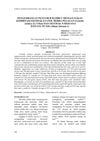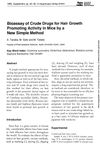5 citations,
January 2015 in “Saudi journal for health sciences” Alopecia areata in Taif is common, mainly immune-related, and best treated with topical corticosteroids and vitamins.
3 citations,
January 2021 in “Journal of dermatology & cosmetology” Current alopecia treatments manage symptoms but don't cure, and better treatments are needed.
 2 citations,
January 2023 in “Pharmaceuticals”
2 citations,
January 2023 in “Pharmaceuticals” Natural products and phytochemicals may help with hair regrowth, but more research is needed.
1 citations,
February 2024 in “Diversity” African plants can treat hair issues and may help with diabetes.
 1 citations,
October 2023 in “Indian dermatology online journal”
1 citations,
October 2023 in “Indian dermatology online journal” Many people use home remedies for skin conditions, but there's limited scientific evidence to support their effectiveness.
 November 2024 in “Skin Appendage Disorders”
November 2024 in “Skin Appendage Disorders” Misinformation about alopecia can lead to poor treatment, so it's important for healthcare professionals to correct myths.
 August 2024 in “Drug Design Development and Therapy”
August 2024 in “Drug Design Development and Therapy” Decursin shows promise for treating cancer, neuroprotection, inflammation, and hair loss.
April 2024 in “International journal of molecular sciences” Combination pharmacotherapy is generally more effective for treating keloids and hypertrophic scars.
 April 2024 in “Scientific reports (Nature Publishing Group)”
April 2024 in “Scientific reports (Nature Publishing Group)” Rosemary and neem extract may be an effective natural treatment for dandruff and hair loss.
December 2023 in “Plants” Fissistigma oldhamii has compounds that help with pain, inflammation, and other health issues.

Nanocarriers with plant extracts show promise for safe and effective hair growth treatment.
 August 2023 in “International journal of experimental research and review”
August 2023 in “International journal of experimental research and review” There are effective treatments available for baldness.
 July 2023 in “Research journal of pharmacy and technology”
July 2023 in “Research journal of pharmacy and technology” The hair tonic with Capsicum frutescens extract helps hair grow in male rabbits.

Plant-based compounds can improve wound dressings and skin medication delivery.
September 2022 in “Translational Andrology and Urology” Finasteride may cause lasting sexual and mental health issues, and genetic screening could help prevent them.
August 2022 in “Metabolic Brain Disease” Ferulic acid may help control menstrual cycle-related epilepsy by affecting female hormones.
 December 2021 in “Jurnal ilmiah Manuntung”
December 2021 in “Jurnal ilmiah Manuntung” The best hair growth results were achieved with a hair tonic containing 5% gotu kola extract and 0.04% garlic extract.
 40 citations,
August 2018 in “Skin appendage disorders”
40 citations,
August 2018 in “Skin appendage disorders” Some alternative treatments for hair loss might work, but more research is needed.
 9 citations,
March 2011 in “Oxidative stress and disease”
9 citations,
March 2011 in “Oxidative stress and disease” Some herbal treatments are effective for skin disorders, but more research and regulation are needed.
 73 citations,
March 2010 in “Food and Chemical Toxicology”
73 citations,
March 2010 in “Food and Chemical Toxicology” Zizyphus jujuba essential oil can promote hair growth.
9 citations,
June 2022 in “Plants” Shallot extract may help with hair growth and treating hair loss.
November 2024 in “Apple Academic Press eBooks” Garlic chives have many health benefits and potential for drug development.
 May 2023 in “Journal of Ethnopharmacology”
May 2023 in “Journal of Ethnopharmacology” The wild garlic plant, Allium macrostemon Bunge, can promote hair growth and could potentially be used to treat hair loss.
 January 2024 in “Natural product research”
January 2024 in “Natural product research” The bulb and shoot of Allium longisepalum contain various compounds with potential health benefits, including antioxidant and anti-inflammatory properties.
 August 2023 in “Vittalle”
August 2023 in “Vittalle” Mais estudos são necessários para garantir a eficácia e qualidade dos tratamentos de alopecia com plantas medicinais.
January 2018 in “Journal of Food Biosciences and Technology” Garlic and fenugreek may help treat hair loss.
 54 citations,
November 1998 in “Archives of dermatology”
54 citations,
November 1998 in “Archives of dermatology” Avoiding certain nutrients and drugs may help manage pemphigus.
 24 citations,
January 2020 in “International Journal of Molecular Sciences”
24 citations,
January 2020 in “International Journal of Molecular Sciences” Some plants with flavonoids may help treat hair loss and promote hair growth.
 16 citations,
January 1980 in “Planta Medica”
16 citations,
January 1980 in “Planta Medica” Some natural extracts and one hair tonic can promote hair growth in mice.
 3 citations,
April 2022 in “Farmacia”
3 citations,
April 2022 in “Farmacia” Certain foods and supplements can help treat skin diseases alongside medication.



















